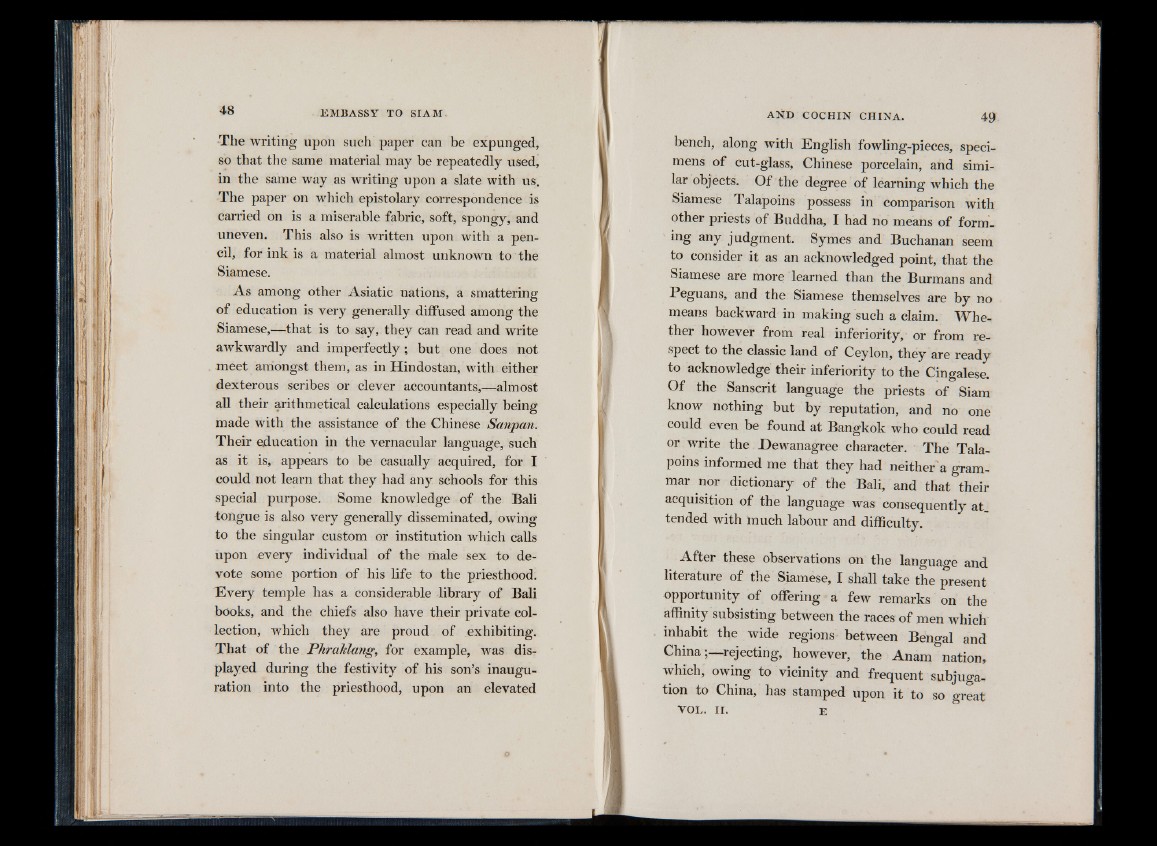
The writing upon such paper can be expunged,
so that the same material may be repeatedly used,
in the same way as writing upon a slate with us.
The paper on which epistolary correspondence is
carried on is a miserable fabric, soft, spongy, and
uneven. This also is written upon with a pencil,
for ink is a material almost unknown to the
Siamese.
As among other Asiatic nations, a smattering
of education is very generally diffused among the
Siamese,—that is to say, they can read and write
awkwardly and imperfectly ; but one does not
meet amongst them, as in Hindostán, with either
dexterous scribes or clever accountants,—almost
all their arithmetical calculations especially being
made with the assistance of the Chinese Sanpan.
Their education in the vernacular language, such
as it is, appears to be casually acquired, for I
could not learn that they had any schools for this
special purpose. Some knowledge of the Bali
tongue is also very generally disseminated, owing
to the singular custom or institution which calls
upon every individual of the male sex to devote
some portion of his life to the priesthood.
Every temple has a considerable library of Bali
books, and the chiefs also have their private collection,
which they are proud of exhibiting.
That of the Phrahlang, for example, was displayed
during the festivity of his son’s inauguration
into the priesthood, upon an elevated
bench, along with English fowling-pieces, specimens
of cut-glass, Chinese porcelain, and similar
objects. Of the degree of learning which the
Siamese Talapoins possess in comparison with
other priests of Buddha, I had no means of forming
any judgment. Symes and Buchanan seem
to consider it as an acknowledged point, that the
Siamese are more learned than the Burmans and
Peguans, and the Siamese themselves are by no
means backward in making such a claim. Whether
however from real inferiority, or from re-
speet to the classic land of Ceylon, they are ready
to acknowledge their inferiority to the Cingalese.
Of the Sanscrit language the priests of Siam
know nothing but by reputation, and no one
could even be found at Bangkok who could read
or write the Dewanagree character. The Talapoins
informed me that they had neither a grammar
nor dictionary of the Bali, and that their
acquisition of the language was consequently at.
tended with much labour and difficulty.
After these observations on the language and
literature of the Siamese, I shall take the present
opportunity of offering a few remarks on the
affinity subsisting between the races of men which
inhabit the wide regions between Bengal and
China; rejecting, however, the Anam nation,
which, owing to vicinity and frequent subjugation
to China, has stamped upon it to so great
v o l . Hi e